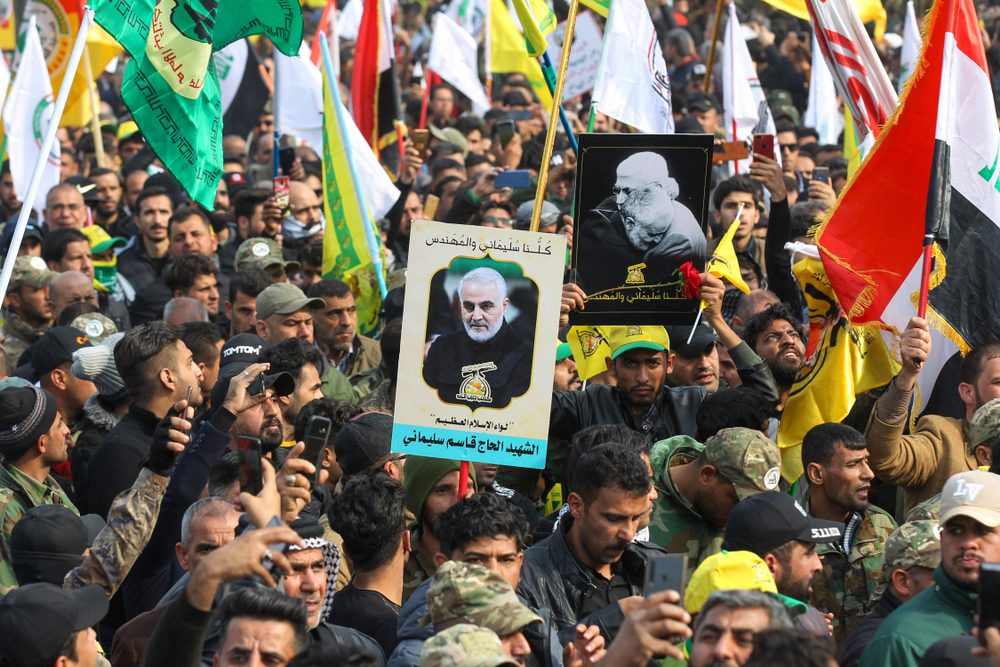Tick Tock: Iraqi Leader Still Under Pressure to Boot U.S. Forces

In the aftermath of a deadly American airstrike that killed Iranian Quds Force commander Qassem Soleimani and an Iraqi militia commander, Iraq demanded the immediate removal of American forces. In the wake of a series of anti-government protests that forced the resignation of Iraq’s interim prime minister and ushered in a period of political instability and division, Baghdad backed off the request, leaving a withdrawal deal to be negotiated by Iraq’s new leader.
Prime Minister Designate Iraqi Prime Minister Mohammed Allawi has a month to attempt to form a government. And the issue of America’s military presence will be front and center for him.
“There are many people in the parliament and in political leadership in Iraq that will make the next prime minister commit to them that he will ask the U.S. to leave, and withdraw all its troops, before they will vote for him,” says Abbas Kadhim, senior fellow and director of the Iraq Initiative at the Atlantic Council, in an interview with The American Conservative.
The “U.S. military presence is a very big issue—as in any other country, foreign troops in Iraq are not popular,” says Kadhim. “Iraqis were tolerating the U.S. presence in the country for quite a while, especially while Americans were there fighting terrorism and building Iraq’s military capacity and several other things, as part of a package of U.S. aid. But that tolerance was reduced significantly after U.S. activities in the last part of December and January, the bombings that killed several people in Iraq, and the killing of Iranian General Soleimaini. That really brought the two sides to a breaking point, and now it’s very hard to make a case to keep U.S. troops as they were there.”
After a new government is formed, the two countries will face a series of talks to rethink their strategic relationship and any future military cooperation.
In light of Iraq’s growing hostility to a prolonged U.S. military occupation and the news that over 100 American service members suffered traumatic brain injuries from the Iranian missile attack in Iraq last month, this is a good time for the United States to reevaluate the partnership too, says Annelle Sheline, research fellow for the Middle East at the Quincy Institute for Responsible Statecraft. That’s especially true since the Iraqi government has announced it will not seek assistance from the U.S.-led coalition in operations against ISIS, the erstwhile reason for the American presence in Iraq.
“Are we there to fight ISIS? Iraq clearly doesn’t want us there to do that anymore; and we accomplished that goal,” says Sheline. Having members of the U.S. military deployed “in Iraq is not making Americans safer, because U.S. soldiers in Iraq are targets caught in the crossfire.”
The Iraqi government’s desire for a U.S. withdrawal could be a gift for the Trump administration, points out Sheline.
“Trump has this great opportunity to make good on the promises he made on the campaign trail and get us out of Iraq,” she says. “He campaigned very strongly on getting us out of Iraq and Afghanistan and the endless wars in the Middle East.”
Kadhim thinks it would be better for the two countries to structure an amicable withdrawal that will see a smaller continued U.S. presence in Iraq.
If the “U.S. would leave and cut all cooperation and alliance with Iraq to combat ISIS, that would hurt U.S. interests in Iraq,” he says. “ISIS has been defeated but there is a lot that U.S. troops are doing to build the capacity of Iraqi forces; they’re part of a larger plan between the two countries; they provide force protection for other countries…[and] also U.S. troops in Iraq are a deterrent against anybody that might want to jeopardize Iraqi security. Iraq stands to gain a lot from cooperation with the U.S., and that would probably be reduced significantly or eliminated if the U.S. is asked to leave in non-amicable ways.”
Bases in Iraq are also subject to attacks from Iran, as it writhes under the Trump administration’s pressure campaign.
“We are contributing to conflict by staying in Iraq,” says Sheline. “The Iraqis have said they’ll work with Russia to reduce dependence on us…meanwhile Iran is just waiting. They’re very good at taking the most opportune moment to strike, and avoiding an out-and-out shooting war. But they’ll find a way to hurt our interests and U.S. service members who are very much in danger continuing to be stationed in Iraq.”
Comments